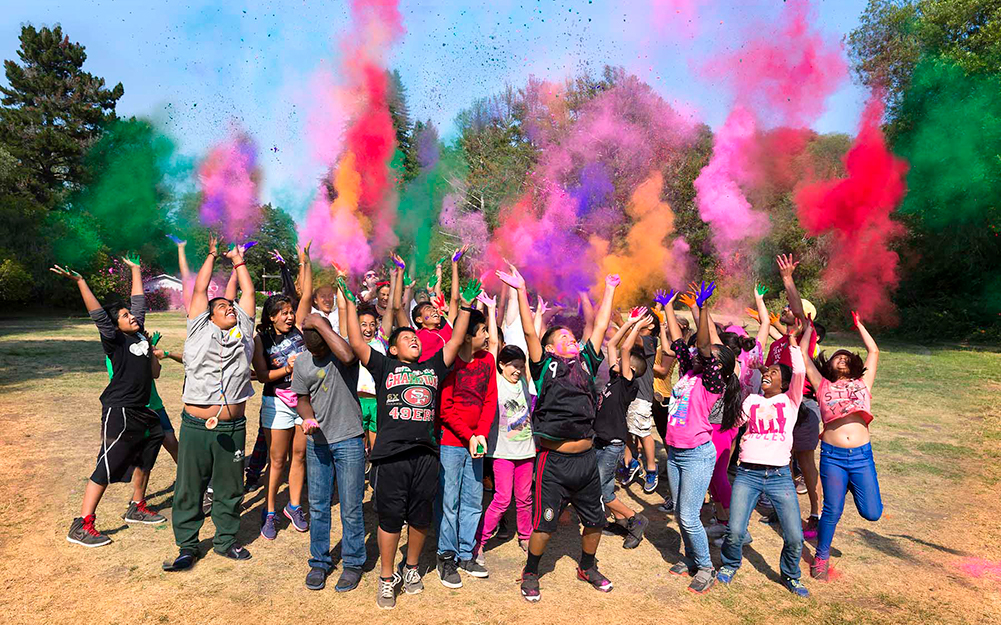Summer Camp Starts In
Day(s)
:
Hour(s)
:
Minute(s)
:
Second(s)
Great news, Phamily! We’re back!
This summer, we’ll be welcoming many of our campers back to the forests of San Gregorio for the first time since the pandemic shut everything down.
Summer camp is more important than ever after a year of COVID-19 school shutdowns and school interruptions. To us, this means providing our kids with opportunities that help them experience joy, love and the opportunities the world has to offer.
Just so everyone knows, during the summer, Camp Phoenix will be a closed site so that both campers and staff can stay safe. As a result, all staff will remain on-site throughout the entire camp season or be allowed to participate in pre-agreed activities off-site during their time off.
Aside from ensuring the safety of our community, we are making sure the Camp Phoenix aura remains as strong and playful as ever.
For our community (and our parents, especially), here are the COVID-19 safety protocols we have put in place to make this year’s camp safe and one to remember.
Pre-Camp Quarantine & Testing Protocols
Despite our optimism that we will see some positive changes in the COVID landscape by camp, we intend to require a period of quarantine followed by a negative COVID test, as recommended by the CDC, before campers arrive at camp. The CDC recommends seven days of quarantine and a negative test within 72 hours of arrival at camp.
Using Oakland Health Centers’ resources, Camp Phoenix staff has arranged for staff and campers to be tested. Camp Phoenix staff will have access to the results of testing conducted as prescribed by the CDC before camp starts.
Each week, camp staff will also administer antigen tests to a sample of campers. Vaccinated campers and staff will not have to undergo any further testing. All campers and staff, however, will have to undergo pre-camp testing.
To be on the safe side, campers are strongly advised to bring four or five washable masks to Camp and a mesh bag labeled with their name for them to keep them in. For cloth masks, two or more layers are required at a minimum. Masks will be washed as often as necessary. The following list of face masks is in accordance with CDC guidelines for in-person programs.
Types of masks allowed:
- Cloth masks with a minimum of two layers of fabric that fit properly, fully covering the mouth and nose and fitting snugly to the sides of the face
- Gaiters that are double-layered
- Non-medical disposable masks
Types of masks not allowed:
- Masks with vents or valves (they allow the virus to escape)
- Masks intended for medical professionals such as N95 or surgical masks
- Open fabric masks such as those made from lace, mesh, or other loose-knit fabrics
Those campers who cannot wear masks due to special circumstances may wear a hooded face shield instead. The shield should be tucked into the shirt or tied around the back of the neck and should be covered with a double layer of cloth.
Transportation Protocols
- Campers will be screened prior to boarding the bus to camp with a series of questions.
- All campers must wear a mask while on the bus. This includes staff supervisors and the bus driver.
- As usual, camper health will be screened upon arrival at camp, which may include temperature checks.
- Masking will be required on all field trips, camp excursions, and bus rides.
Onsite Protocols
- Campers will be assigned to their cabin cohorts for meals, sleeping, and any activities where physical distancing is not possible.
- Face masks will be worn whenever someone goes indoors, which for most campers will be to use the bathrooms, or when cabin cohorts are mixing and physical distancing is not possible. The only exceptions are when fully vaccinated staff are together indoors, such as working in the kitchen or preparing for classes.
- Daily temperature checks at breakfast and eating all meals with their cabin groups outdoors when possible
- Increased hand hygiene (handwashing and sanitizing stations posted throughout camp) and outdoor time
- Daily sanitizing of all high-touch surfaces, e.g., gear, doorknobs, tables
- Masking when required
- Heel-to-toe sleeping arrangements in cabins
- As much as possible, activities and meals will be conducted outdoors, not in the dining hall.
- If a camper presents with symptoms that are similar to COVID and cannot be explained by other conditions as described on their health form, we may conduct a rapid test at camp. As a precaution, we will immediately place the camper in our Isolation Cabin 2021. If a positive test is verified, the camper will remain in isolation and their parents will be notified. Campers and staff in that cohort will be kept at a distance from other cohorts for camp activities, and symptoms will be monitored.

